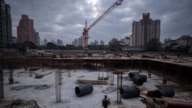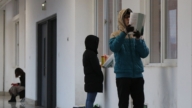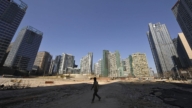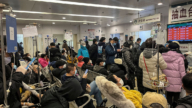【新唐人2012年6月20日訊】5月以來,有關各地樓盤銷售火爆的消息越來越多。「購房潮」彷彿重現樓市。專家指出,中共高層因擔心房價太高,老百姓起來造反,不得不對房市進行打壓,然而長期的房地產市場疲軟,內需帶動不起來,中國的經濟已經進入死胡同,為了保增長,政府放寬銀根,卻被利益集團利用,又一次投入房地產,成為這次所謂「購房潮」的真正推手。
國家統計局數據顯示,5月全國商品住宅成交環比增長16.37%,成交額環比增長19.12%。不過價格並沒有上漲,「以價換量」仍是目前市場主流的銷售策略。
今年央行連續降低存款準備金率,6月7號,央行三年半以來首次宣佈降息。利率調整後,貸款買房的月供將減少,購房者的負擔有所減輕。降息進一步降低了剛性需求購房的門檻。
美國南卡羅萊納大學艾肯商學院教授謝田表示,中共高層為了保增長,放鬆貸款之後,大筆的錢又進入大型國企及有裙帶關係的利益集團手中,而房地產卻是這些人瞄準的最容易產生最大利潤的地方。
美國南卡羅萊納大學艾肯商學院教授謝田:「中國現在確實處於進退兩難的境地,它不希望房價太高,而讓老百姓民怨太沸騰,會起來造反,另一方面他也不希望房市破滅,使他的銀行和國企處於破滅的境地。」
謝田指出,實際上中國的經濟在放緩,生產率指數在下降,能源消耗在下降,進出口也在減緩,謝田說,在這種經濟不景氣的情況下,出現這種樓市泡沫對中國經濟非常有害。
謝田:「只要它的銀根放鬆,另外一個更大的問題就是通貨膨脹可能會加劇,這個也是中共不願看到的景象,但是我想,房市這個熱度如果繼續保持這樣的話,下一步通貨膨脹很可能就會蠢蠢慾動,就會繼續往上攀升的。」
謝田說,溫家寶每次想把房價壓下去,最後都被利益集團拖了下來。
中國著名經濟學家茅於軾的助手,北京師範大學MBA導師段紹譯也認為,目前這種所謂的「購房潮」,仍然是一種泡沫,他說,政府調控房市是對的,但方式不對。
段紹譯:「政府要真正調控市場,就是要讓市場回歸理性,要讓市場資源得到優化的重視,不能用行政干預的做法來調控過去的錯誤,政府如果要真正的調控的話,第一要小產權合法化,第二讓土地私有化。」
一些城市微調了樓市政策,甚至在一定程度上放鬆了調控。樓市的「價格底」和「政策底」似乎都已形成,不少購房者又開始感到恐慌。
段紹譯認為,中國人不理性的投機心理也是造成樓市泡沫的原因之一。
中共喉舌《新華網》發表文章,以所謂「一些人有意誤讀政策信號希望再次炒高房價」來抑制這次「購房潮」。
國務院發展研究中心金融研究所研究員巴曙松在文章中說,從供求關係看,2011年房地產在建規模達到40億平方米左右,銷售僅10億平方米左右,供大於求的格局短期不會改變。
採訪編輯/劉惠 後製/鍾元
China’s Dilemma of “Home Buying Wave”
Since May 2012, China’s real estate market is going up.
the “Home Buying Wave” seems to be coming back.
Experts point out that the Chinese Communist Party (CCP),
fearing people will protest against the high real estate prices, has to curb the real estate market’ prices increase.
However, weak long-term real estate can’t drive the demand,
leading China’s economy to a dead-end.
In order to secure growth, the government had loosened
the policies on investment.
Nevertheless this is again used by interest groups,
to invest in real estate and push up the real estate market.
According to China’s National Bureau of Statistics,
in May, housing turnover increased from 16.37 to 19.12%.
The price did not increase. Curbing the price and encouraging
sales is still the key strategy for the real estate market.
This year, China’s central bank consecutively dropped
the deposit reserve ratio.
On June 7, the central bank announced interest cut
for the first time in three years.
This will help reduce the home buyers’ mortgage burden,
and the rigid requirements for new home buyers.
Professor Xie Tian from University of South Carolina’s
Aiken School of Business analyzed the issue.
Prof. Xie thinks that to promote high growth,
the CCP had loosened investment policies.
Large amounts of money end up in the interest groups’hands.
Real estate is the area targeted for highest profits.
Prof. Xie Tian: “China is in a dilemma
[on the real estate market issue].
On one hand, it does not want housing prices to be high,
in fear of people’s dissatisfaction and potential protests;
on the other, it does not want the housing market to collapse,
which would destroy its banking and state-owned enterprises.”
Prof. Xie also pointed out that China’s economy
is in fact slowing down.
Production ratio, energy consumption,
and import and export are declining.
In this situation, the housing bubble can be very harmful
to the economy of China.
Prof. Xie Tian: “If banks get loose, inflation might get worse.
The CCP does not want this to happen.
I think if the housing market continues to heat up,
inflation might go even higher.”
Prof. Xie said that each time Chinese Premier Wen Jiabao
tries to curb housing prices, interest groups would obstruct it.
Duan Shaoyi, lecturer at Bejing Normal University MBA,
and an assistant of China’ renowned economist Mao Yushi,
also thinks the current “Home Buying Wave” is still a bubble.
The government is right to control the housing market,
but it is doing it the wrong way, the expert thinks.
Duan Shaoyi: “The government needs to guide the market
towards getting it back to normal.
It should optimize the use of market resources,
not correcting past mistakes by exercising control over it.
It should first legalize property rights,
and then privatize lands.”
Some cities have slightly adjusted housing market,
and in certain way of loosing its control;
The bottom line of prices and policy seem had formed,
many home buyers are starting to worry.
Duan Shaoyi thinks people’s irrational investing mentality
is also a reason for the housing bubble.
The site xinghua.net, CCP’s mouthpiece, published an article,
in support of curbing the “Home Buying Wave.”
It said, “Some people intentionally misrepresent policies,
with the hope to increase the home prices.”
In this article, Ba Shusong, Research Fellow at State Council’
Development Research Center of Finances talks on the issue from the perspective of supply and demand.
Ba states that of the 4 billion square meters real estate,
built in 2011, only 1billion was sold.
Thus the ratio of supply and demand
does not seem feasible to change in the near future.






























